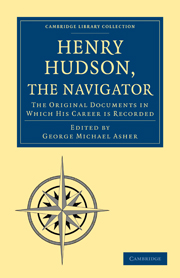Book contents
- Frontmatter
- Contents
- Introduction
- Notes to Introduction
- DIVERS VOYAGES AND NORTHERNE DISCOVERIES
- Divers voyages and northerne discoveries of that worthy discoverer Henry Hudson, from Purchas' Pilgrims, vol. iii, pp. 567-610
- A larger Discourse of the same Voyage and the success thereof, written by Abacuk Pricket
- A note found in the deske of Thomas Wydowse, student of mathematics, one of them who was put into the shallop
- Purchas his Pilgrimage, folio, London, 1626, p. 817. VI. Of Hudson's discoveries and death
- Hudson's first voyage (1607), from Edge's brief discoverie of the Muscovia merchants
- Captain Fotherby's statement concerning Hudson's Journal of his first voyage
- Hudson's third voyage (1609) from Van Meteren's Historie der Nederlanden. Folio, Hague, 1614, fol. 629a
- Extracts relating to Hudson's third voyage (1609), from John de Laet's Nieuwe Werelt, fol., Amsterdam, 1625, 1630-1
- Extracts containing some original information about Hudson's third voyage, from Mr. Lambrechtsen van Ritthem's ‘History of New Netherland’
- Extracts concerning Hudson's third voyage (1609), from Adrian van der Donck's ‘Beschryvinge van Nieuw Nederlandt,’ 4to., Amsterdam, 1655, 1656
- American traditions concerning the third voyage (1609)
- An Extract from Captain Luke Foxe's description of Hudson's fourth voyage (North-West Fox) p. 70
- Hessel Gerritz's various accounts of Hudson's two last voyages, from the Latin and Dutch edition of the ‘Descriptio et Delineatio Geographica detectionis Freti ab H. Hudsono inventi.’ Amst., 1612, 1613: I. Hudson's fourth voyage. A summary printed on the back of the chart. An account of the voyage and new found strait of Mr. Hudson
- APPENDIX
- Index
- Plate section
Extracts relating to Hudson's third voyage (1609), from John de Laet's Nieuwe Werelt, fol., Amsterdam, 1625, 1630-1
Published online by Cambridge University Press: 05 August 2011
- Frontmatter
- Contents
- Introduction
- Notes to Introduction
- DIVERS VOYAGES AND NORTHERNE DISCOVERIES
- Divers voyages and northerne discoveries of that worthy discoverer Henry Hudson, from Purchas' Pilgrims, vol. iii, pp. 567-610
- A larger Discourse of the same Voyage and the success thereof, written by Abacuk Pricket
- A note found in the deske of Thomas Wydowse, student of mathematics, one of them who was put into the shallop
- Purchas his Pilgrimage, folio, London, 1626, p. 817. VI. Of Hudson's discoveries and death
- Hudson's first voyage (1607), from Edge's brief discoverie of the Muscovia merchants
- Captain Fotherby's statement concerning Hudson's Journal of his first voyage
- Hudson's third voyage (1609) from Van Meteren's Historie der Nederlanden. Folio, Hague, 1614, fol. 629a
- Extracts relating to Hudson's third voyage (1609), from John de Laet's Nieuwe Werelt, fol., Amsterdam, 1625, 1630-1
- Extracts containing some original information about Hudson's third voyage, from Mr. Lambrechtsen van Ritthem's ‘History of New Netherland’
- Extracts concerning Hudson's third voyage (1609), from Adrian van der Donck's ‘Beschryvinge van Nieuw Nederlandt,’ 4to., Amsterdam, 1655, 1656
- American traditions concerning the third voyage (1609)
- An Extract from Captain Luke Foxe's description of Hudson's fourth voyage (North-West Fox) p. 70
- Hessel Gerritz's various accounts of Hudson's two last voyages, from the Latin and Dutch edition of the ‘Descriptio et Delineatio Geographica detectionis Freti ab H. Hudsono inventi.’ Amst., 1612, 1613: I. Hudson's fourth voyage. A summary printed on the back of the chart. An account of the voyage and new found strait of Mr. Hudson
- APPENDIX
- Index
- Plate section
Summary
As to the first discovery, the Directors of the privileged East India Company, in 1609, dispatched the yacht, ‘Half Moon,’ under the command of Henry Hudson, captain and super-cargo, to seek a passage to China by the north-east. But he changed his course and stood over towards New France, and having passed the banks of Newfoundland in latitude 43° 23', he made the land in latitude 44° 15', with a west-north-west and north-west course, and went on shore at a place where there were many of the natives with whom, as he understood, the French came every year to trade. Sailing hence, he bent his course to the south, until running south-south-west and south-west by south, he again made land in latitude 41° 43′, which he supposed to be an island, and gave it the name of New Holland, but afterwards discovered that it was Cape Cod, and that according to his observation, it lay two hundred and twenty-five miles to the west of its place on all the charts. Pursuing his course to the south, he again saw land in latitude 37° 15′; the coast was low, running north and south, and opposite to it lay a bank or shoal, within which there was a depth of eight, nine, ten, eleven, seven, and six and a half fathoms, with a sandy bottom. Hudson called this place Dry Cape.
- Type
- Chapter
- Information
- Henry Hudson the NavigatorThe Original Documents in which his Career is Recorded, pp. 154 - 163Publisher: Cambridge University PressPrint publication year: 2010First published in: 1860

